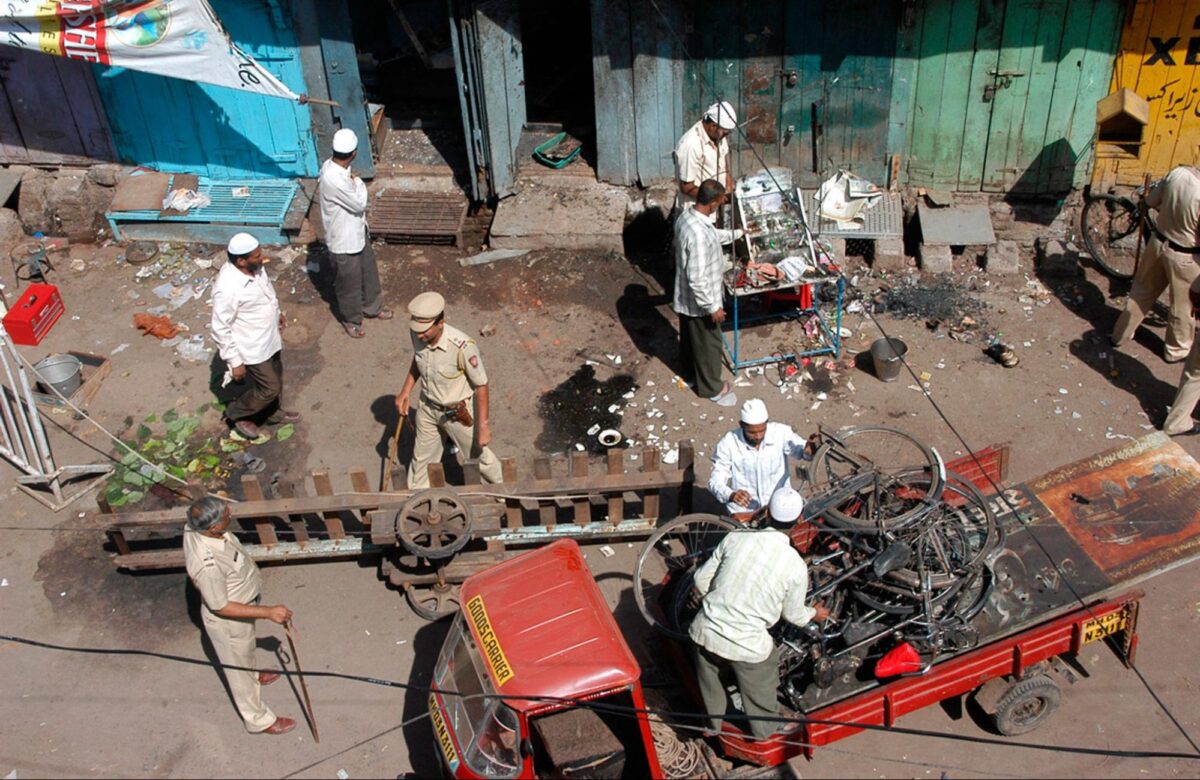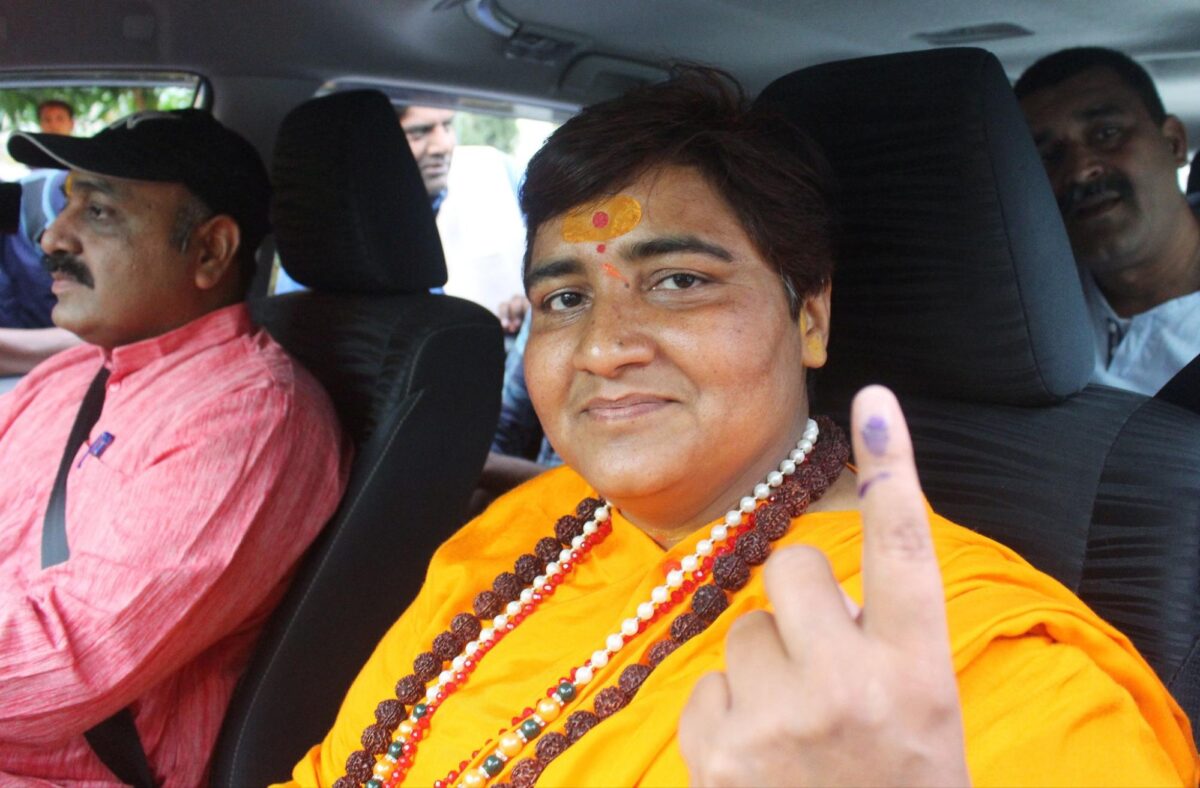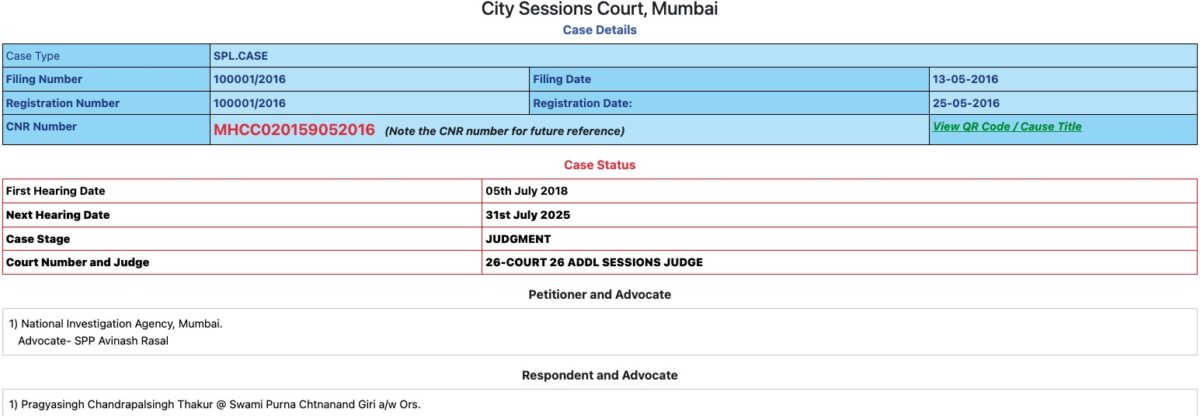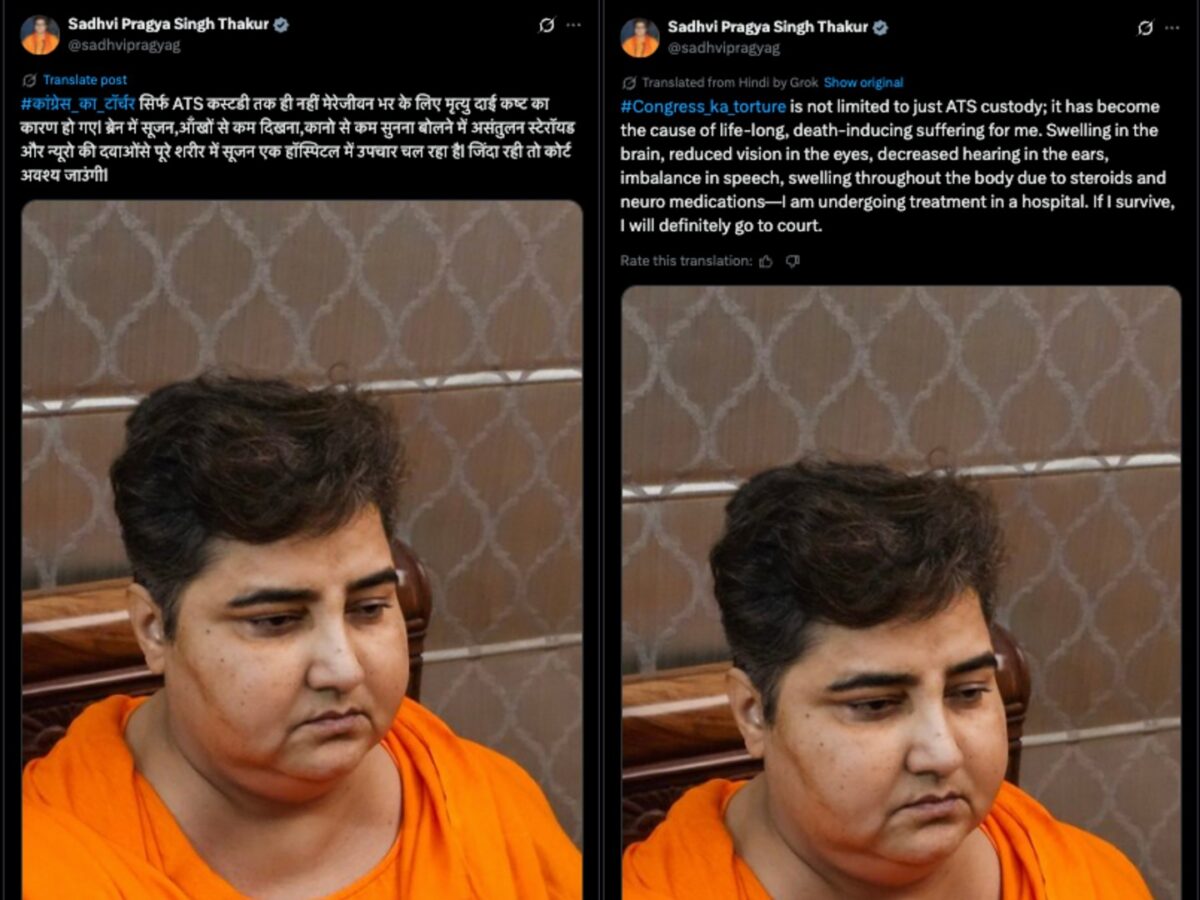Former Indian MP’s Terror Trial Was Largely Conducted in Her Absence
This article includes data from Justice Delayed, an ongoing project by the author to create a database of criminal cases from more than 650 district courts in India.
On the night of Sept. 29, 2008, an explosion ripped through a crowded area in the predominantly Muslim city of Malegaon, Maharashtra in India, killing six people and injuring more than a hundred others. Investigators alleged that the blast was triggered by a bomb planted in a motorcycle registered to Pragya Chandrapalsingh Thakur, then a 38-year-old nun and Hindutva (or Hindu nationalist) activist.
Thakur was the most high profile of the seven people arrested and charged for their alleged involvement in the blast. Almost 17 years later, all of the accused have been acquitted, with the judge reportedly saying that the prosecution could not prove that the bomb was fitted to the motorcycle or that it belonged to Thakur.

Appearing in court on Thursday, Thakur reportedly told the judge that the investigation had “ruined [her] life”. She was quoted by several outlets saying that she had been “arrested and tortured” by investigators. She also hailed her acquittal as a “victory of Hindutva”.
Meanwhile, the advocate for the victims’ families has reportedly vowed to challenge the acquittals in India’s High Court.
Thakur’s court appearance on Thursday was a rare one: she has been notably absent for most of the trial, citing medical reasons including brain swelling, impaired sight, and a doctor advising bed rest “due to multiple ailments”.
Subscribe to the Bellingcat newsletter
Subscribe to our newsletter for first access to our published content and events that our staff and contributors are involved with, including interviews and training workshops.
Although attending hearings related to her case was a key condition of her bail, a Bellingcat analysis of documents from the NIA special court shows she was recorded as present at only three of the 162 court appointments that focused on final arguments of the case, from July 24, 2024 to May 8, 2025.
As of publication, Thakur has not replied to multiple requests for comment over email, text messages, and social media about her absences from court. One of her lawyers, Advocate JP Mishra, told Bellingcat that he only has the contact number of Thakur’s personal assistant, and not of Thakur herself.
Thakur has been on bail since April 2017, when organised crime charges against her were dropped by the Maharashtra Anti-Terrorism Squad (ATS), a state police body. A year later, the National Investigation Agency (NIA) – the main counter-terrorism investigation agency in India – initiated a new case against Thakur and six others over their alleged involvement in the same incident.
In 2019, Thakur was elected as a Member of Parliament for the central Indian state of Madhya Pradesh under the ruling Hindu nationalist Bharatiya Janata Party (BJP), and served five years in the role before stepping down in 2024 at the end of her term.
Pragya Thakur: Murder Suspect Turned Politician
This is the second criminal case where Thakur has been charged, and then acquitted due to a lack of evidence.
She was previously accused, then acquitted in 2017, of being one of eight people involved in the December 2007 murder of Sunil Joshi, reportedly a close aide of Thakur before they fell out.
Joshi was a suspect in the 2007 Samjhauta Express train bombing which killed 68 people, mostly Pakistan citizens. Based on local reports, the court acquitted Thakur and her co-accused after finding the case was not investigated with the “required seriousness” by the NIA and state police, who it said produced “weak and self-contradictory evidences”. Thakur was not present in court when the verdict for this case was delivered.
When the BJP fielded her as a candidate in the 2019 general elections, Thakur had been accused of terrorism, murder and criminal conspiracy over the 2008 Malegaon blast.
Nisar Ahmed Sayyed Bilal, whose son was one of the victims of the Malegaon bombing, filed an application in the trial court to prevent her from running in the election, but this was dismissed.
Thakur won her seat by a wide margin against her opponent – a two-time chief minister of the state – and served as a member of parliament for five years.

While in office, Thakur continued to be a controversial figure. She was often quoted making incendiary comments against the country’s minority Muslim community, including accusing them of “love jihad” and encouraging Hindus to arm themselves against Muslims by sharpening their kitchen knives. This was despite the fact that she was representing a constituency with a significantly Muslim population of more than half a million, as of the latest 2011 census data.
In one of her speeches delivered in parliament in December 2023, Thakur criticised the previous government for allowing Muslims accused of crimes to secure bail “despite being criminals”, even though she was out on bail herself.
She has also been quoted in reports claiming that cow urine can protect against Covid-19 and that the same substance had cured her breast cancer. However, a surgeon who operated on her was quoted in an interview saying that she underwent a mastectomy for the latter condition. One of her lawyers, Advocate JP Mishra, also told Bellingcat that Thakur had two surgeries while in jail, and one after her release, to fight cancer.
The verdict on Thursday marks the end of one of the longest-running terrorism trials in the country.
Procedural delays are not uncommon in India’s justice system – it reportedly has a staggering backlog of 50 million pending cases – but Bellingcat’s analysis found that this case took much longer than other similar ones under India’s anti-terror Unlawful Activities (Prevention) Act (UAPA). Data from the NIA special court, which only deals with charges under the UAPA, shows that five other trials it recorded as completed as of July 25 this year were decided in an average of 19.6 months. The Malegaon case was heard 1,187 times over a period of 84 months before Thursday’s verdict was delivered.
Getting the Data
In India’s justice system, each case before a court is assigned a unique Case Number Record (CNR), which is used for all documents related to that case.
The CNR may change if the case is transferred between courts. For example, the Malegaon case had a different CNR in the 10 years that it was being investigated by the ATS before it was handed over to the NIA.
Searching the eCourts website for case number MHCC020159052016, the CNR assigned to the proceedings for the NIA special court case, returned 1,187 unique court records from July 5, 2018 to May 8, 2025.

We focused on the hearings that took place after final arguments began on July 24, 2024, up to May 8, 2025, when the verdict was initially scheduled to be delivered. The May 8 hearing was postponed to July 31, and there were no other court appearances recorded between then and Thursday’s verdict.
Of the 162 court records of the case we extracted for this period, one case from October 17, 2024 had no notes recorded in the documents, making it impossible to determine if Thakur was present or not.
For the remaining 161 documents, we manually checked the text to determine if Thakur was recorded as present. The full dataset of these documents, as well as the assessment by two independent coders (the author and editor of this story), can be accessed here.
Our analysis showed that Thakur was recorded as present on only three occasions during this period – first on January 30, 2024, more than six months after the final arguments began, at a hearing the next day, and again on May 8 this year when the verdict was originally scheduled to be delivered.
Medical Reasons Cited for Absences
Court documents and local reports show that Thakur’s absence from proceedings for this case dates back years. While the court has accepted medical certificates produced by her advocates, the judges presiding over the case have also repeatedly noted her absences, with one judge specifically stating in 2019 that she should be in court at least once a week. In December 2020, the prosecution argued that it appeared as if she was deliberately avoiding appearing in court.
“It seems that they have taken the legal process and court for granted,” Advocate Shahid Nadeem, a representative for the victims, told Bellingcat in an email prior to the verdict.
A timeline of Thakur’s court attendance during the final arguments:
Thakur has not attended court since June 3, 2024.
Court orders her to appear by Aug. 20.
Court orders her to appear by Aug. 31.
Court orders her to appear by Sept. 18.
Court orders her to appear by Sept. 30.
Court orders her to appear on Oct. 3.
Court orders her to appear by Oct. 16.
Court orders her to appear on Oct. 24.
Court orders her to appear on Nov. 5.
Bailable arrest warrant issued against her with an order to appear by Nov. 13.
Says she will appear on or before Dec. 30.
Thakur’s lawyer says she will appear by Jan. 12.
Promises she will attend court on Jan. 22.
Lawyer says she will attend by Jan. 30.
Bailable warrant cancelled.
Exemptions are granted but no specific reasons are recorded in documents.
Exemptions are granted but no specific reasons are recorded in documents.
Exemptions are granted but no specific reasons are recorded in documents.
Judge pushes back verdict to July 31.
Thakur has maintained that her absences from court were justified by medical reasons, including conditions she claims were caused by “torture” while in custody of the ATS. During her term as an MP, the court also granted exemptions to her court appearance based on her lawyers’ arguments that she needed to attend parliamentary sessions.
On Sept. 3, 2024, Thakur’s lawyers filed for an exemption for her appearance in court, saying she was “suffering from neurological problem with swelling in brain and is unable to see properly”. The court approved the application on the condition that exemptions were filed for each day the case was heard until Thakur appeared, stating that she should appear at the latest by Sept. 18.
A week after this application, on Sept. 10, a local BJP leader from Bhopal posted a video on Instagram showing Thakur attending a groundbreaking ceremony for a temple in the Madhya Pradesh city. Bellingcat was unable to independently verify when this groundbreaking ceremony took place, and whether it was during the period that Thakur’s lawyers said she was seriously ill. Bellingcat emailed Kishan Suryavanshi, the local leader who posted the video, to ask when it was recorded, but did not receive a reply as of publication.

Support Bellingcat
Your donations directly contribute to our ability to publish groundbreaking investigations and uncover wrongdoing around the world.
On Sept. 18, Thakur’s lawyers filed another application saying that she had been moved from a hospital in Bhopal to one in Meerut, in the neighbouring Uttar Pradesh state. The application said her medical condition had deteriorated, that she was “unable to see properly” and that it would take a “long time” for her recovery. The court approved this application, with the same condition that her lawyers must file exemptions for each hearing that she was absent from court, until a latest date of Sept. 30.
When yet another application was filed for similar reasons on Sept. 30, Special Judge AK Lahoti warned that Thakur should appear by Oct. 3, or a court order would be issued. One of Thakur’s lawyers began making final arguments for her case that day.
Despite this warning, the judge continued to grant exemption applications made for Thakur throughout October, as final arguments specific to the charges against her continued in court. Finally, on Nov. 5, 2024, Lahoti rejected an application by Thakur’s lawyers to exempt her from court yet again.
This application, according to the court documents, was filed with a photocopy of a medical certificate showing that Thakur was undergoing “panchkarm treatment”. This may refer to Panchakarma, a type of Ayurvedic or alternative medical treatment. Mishra, Thakur’s lawyer, told Bellingcat that Thakur was in an Ayurvedic hospital in Meerut at the time.
In response, Lahoti issued a bailable warrant of 10,000 Indian Rupees (US$114) for Thakur, stating that the final hearing would proceed and that Thakur’s presence “is necessary”. A bailable warrant is a warrant for arrest that allows the accused to be released if bail is paid to guarantee their appearance in court.
The next day, a photo of Thakur was posted to her X profile, with her face looking slightly swollen. In the caption, she seemed to blame the Indian National Congress for “torture” and “suffering”, including brain swelling as well as hearing and visual impairment. The last line of her post, in Hindi, translates to, “If I live through this, I will definitely go to court.”

‘No Special Treatment’
Thakur’s trial has been a controversial one. In 2015, the former special public prosecutor (SPP) assigned to the case, Rohini Salian, said the NIA had asked her to “go soft” on the case, an allegation the agency denied.
Nadeem, the advocate for the victims, told Bellingcat: “As far as the appearance of the accused during the trial, NIA’s prosecutor has not taken objection to the exemption application of the accused on most of the occasions.”
“Victims have limited rights in criminal trials,” he said.
Bellingcat contacted three senior officials in the NIA vertical of the Counter Terrorism and Counter Radicalization Division, which is part of the Ministry of Home Affairs of India, asking to discuss how the agency viewed Thakur’s absence from court. As of publication, the officials had not replied to multiple emails.
The current SPP Avinash Rasal told Bellingcat that Thakur had provided medical reasons for her absences during the final arguments and that her reasons were considered by the court. “At no time the case was stalled due to non-appearance of the accused. Their advocates always remained present,” he added.
Bellingcat’s analysis shows that Thakur’s advocates were recorded as present at all 161 hearings after final arguments began.
On at least two occasions in October 2024, the judge accepted the exemptions filed for her absence while noting that her advocates were present and her absence was “not causing any hurdle in the smooth trial”. The same judge, however, also said the next month that her presence was necessary for the final arguments.
Rasal said there was “no pressure” on the prosecution due to Thakur’s position as a member of parliament.
“No special treatment was given to anyone.”
Galen Reich designed the scrolling timeline for this piece.
Bellingcat is a non-profit and the ability to carry out our work is dependent on the kind support of individual donors. If you would like to support our work, you can do so here. You can also subscribe to our Patreon channel here. Subscribe to our Newsletter and follow us on Twitter here and Mastodon here.
